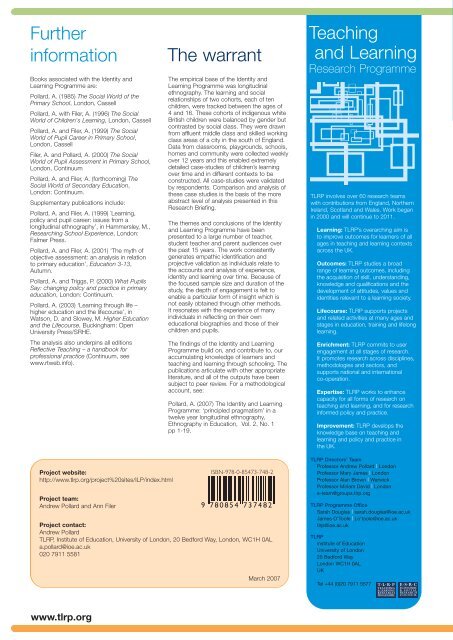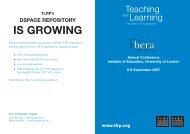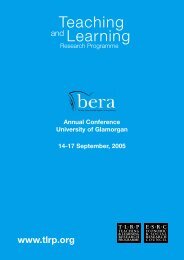Education, schooling and learning for life - Teaching and Learning ...
Education, schooling and learning for life - Teaching and Learning ...
Education, schooling and learning for life - Teaching and Learning ...
You also want an ePaper? Increase the reach of your titles
YUMPU automatically turns print PDFs into web optimized ePapers that Google loves.
Further<br />
in<strong>for</strong>mation<br />
Books associated with the Identity <strong>and</strong><br />
<strong>Learning</strong> Programme are:<br />
Pollard, A. (1985) The Social World of the<br />
Primary School, London, Cassell<br />
Pollard, A. with Filer, A. (1996) The Social<br />
World of Children's <strong>Learning</strong>, London, Cassell<br />
Pollard, A. <strong>and</strong> Filer, A. (1999) The Social<br />
World of Pupil Career in Primary School,<br />
London, Cassell<br />
Filer, A. <strong>and</strong> Pollard, A. (2000) The Social<br />
World of Pupil Assessment in Primary School,<br />
London, Continuum<br />
Pollard, A. <strong>and</strong> Filer, A. (<strong>for</strong>thcoming) The<br />
Social World of Secondary <strong>Education</strong>,<br />
London: Continuum.<br />
Supplementary publications include:<br />
Pollard, A. <strong>and</strong> Filer, A. (1999) `<strong>Learning</strong>,<br />
policy <strong>and</strong> pupil career: issues from a<br />
longitudinal ethnography’, in Hammersley, M.,<br />
Researching School Experience, London:<br />
Falmer Press.<br />
Pollard, A. <strong>and</strong> Filer, A. (2001) ‘The myth of<br />
objective assessment: an analysis in relation<br />
to primary education’, <strong>Education</strong> 3-13,<br />
Autumn.<br />
Pollard, A. <strong>and</strong> Triggs, P. (2000) What Pupils<br />
Say: changing policy <strong>and</strong> practice in primary<br />
education, London: Continuum.<br />
Pollard, A. (2003) ‘<strong>Learning</strong> through <strong>life</strong> –<br />
higher education <strong>and</strong> the <strong>life</strong>course’, in<br />
Watson, D. <strong>and</strong> Slowey, M. Higher <strong>Education</strong><br />
<strong>and</strong> the Lifecourse, Buckingham: Open<br />
University Press/SRHE.<br />
The analysis also underpins all editions<br />
Reflective <strong>Teaching</strong> – a h<strong>and</strong>book <strong>for</strong><br />
professional practice (Continuum, see<br />
www.rtweb.info).<br />
The warrant<br />
The empirical base of the Identity <strong>and</strong><br />
<strong>Learning</strong> Programme was longitudinal<br />
ethnography. The <strong>learning</strong> <strong>and</strong> social<br />
relationships of two cohorts, each of ten<br />
children, were tracked between the ages of<br />
4 <strong>and</strong> 16. These cohorts of indigenous white<br />
British children were balanced by gender but<br />
contrasted by social class. They were drawn<br />
from affluent middle class <strong>and</strong> skilled working<br />
class areas of a city in the south of Engl<strong>and</strong>.<br />
Data from classrooms, playgrounds, schools,<br />
homes <strong>and</strong> community were collected weekly<br />
over 12 years <strong>and</strong> this enabled extremely<br />
detailed case-studies of children’s <strong>learning</strong><br />
over time <strong>and</strong> in different contexts to be<br />
constructed. All case-studies were validated<br />
by respondents. Comparison <strong>and</strong> analysis of<br />
these case studies is the basis of the more<br />
abstract level of analysis presented in this<br />
Research Briefing.<br />
The themes <strong>and</strong> conclusions of the Identity<br />
<strong>and</strong> <strong>Learning</strong> Programme have been<br />
presented to a large number of teacher,<br />
student teacher <strong>and</strong> parent audiences over<br />
the past 15 years. The work consistently<br />
generates empathic identification <strong>and</strong><br />
projective validation as individuals relate to<br />
the accounts <strong>and</strong> analysis of experience,<br />
identity <strong>and</strong> <strong>learning</strong> over time. Because of<br />
the focused sample size <strong>and</strong> duration of the<br />
study, the depth of engagement is felt to<br />
enable a particular <strong>for</strong>m of insight which is<br />
not easily obtained through other methods.<br />
It resonates with the experience of many<br />
individuals in reflecting on their own<br />
educational biographies <strong>and</strong> those of their<br />
children <strong>and</strong> pupils.<br />
The findings of the Identity <strong>and</strong> <strong>Learning</strong><br />
Programme build on, <strong>and</strong> contribute to, our<br />
accumulating knowledge of learners <strong>and</strong><br />
teaching <strong>and</strong> <strong>learning</strong> through <strong>schooling</strong>. The<br />
publications articulate with other appropriate<br />
literature, <strong>and</strong> all of the outputs have been<br />
subject to peer review. For a methodological<br />
account, see:<br />
Pollard, A. (2007) The Identity <strong>and</strong> <strong>Learning</strong><br />
Programme: ‘principled pragmatism’ in a<br />
twelve year longitudinal ethnography,<br />
Ethnography in <strong>Education</strong>, Vol. 2, No. 1<br />
pp 1-19.<br />
<strong>Teaching</strong><br />
<strong>and</strong> <strong>Learning</strong><br />
Research Programme<br />
TLRP involves over 60 research teams<br />
with contributions from Engl<strong>and</strong>, Northern<br />
Irel<strong>and</strong>, Scotl<strong>and</strong> <strong>and</strong> Wales. Work began<br />
in 2000 <strong>and</strong> will continue to 2011.<br />
<strong>Learning</strong>: TLRP’s overarching aim is<br />
to improve outcomes <strong>for</strong> learners of all<br />
ages in teaching <strong>and</strong> <strong>learning</strong> contexts<br />
across the UK.<br />
Outcomes: TLRP studies a broad<br />
range of <strong>learning</strong> outcomes, including<br />
the acquisition of skill, underst<strong>and</strong>ing,<br />
knowledge <strong>and</strong> qualifications <strong>and</strong> the<br />
development of attitudes, values <strong>and</strong><br />
identities relevant to a <strong>learning</strong> society.<br />
Lifecourse: TLRP supports projects<br />
<strong>and</strong> related activities at many ages <strong>and</strong><br />
stages in education, training <strong>and</strong> <strong>life</strong>long<br />
<strong>learning</strong>.<br />
Enrichment: TLRP commits to user<br />
engagement at all stages of research.<br />
It promotes research across disciplines,<br />
methodologies <strong>and</strong> sectors, <strong>and</strong><br />
supports national <strong>and</strong> international<br />
co-operation.<br />
Expertise: TLRP works to enhance<br />
capacity <strong>for</strong> all <strong>for</strong>ms of research on<br />
teaching <strong>and</strong> <strong>learning</strong>, <strong>and</strong> <strong>for</strong> research<br />
in<strong>for</strong>med policy <strong>and</strong> practice.<br />
Improvement: TLRP develops the<br />
knowledge base on teaching <strong>and</strong><br />
<strong>learning</strong> <strong>and</strong> policy <strong>and</strong> practice in<br />
the UK.<br />
Project website:<br />
http://www.tlrp.org/project%20sites/ILP/index.html<br />
Project team:<br />
Andrew Pollard <strong>and</strong> Ann Filer<br />
ISBN-978-0-85473-748-2<br />
9 7 8 0 8 5 4 7 3 7 4 8 2<br />
Project contact:<br />
Andrew Pollard<br />
TLRP, Institute of <strong>Education</strong>, University of London, 20 Bed<strong>for</strong>d Way, London, WC1H 0AL<br />
a.pollard@ioe.ac.uk<br />
020 7911 5581<br />
March 2007<br />
TLRP Directors’ Team<br />
Professor Andrew Pollard | London<br />
Professor Mary James | London<br />
Professor Alan Brown | Warwick<br />
Professor Miriam David | London<br />
e-team@groups.tlrp.org<br />
TLRP Programme Office<br />
Sarah Douglas | sarah.douglas@ioe.ac.uk<br />
James O'Toole | j.o'toole@ioe.ac.uk<br />
tlrp@ioe.ac.uk<br />
TLRP<br />
Institute of <strong>Education</strong><br />
University of London<br />
20 Bed<strong>for</strong>d Way<br />
London WC1H 0AL<br />
UK<br />
Tel +44 (0)20 7911 5577<br />
www.tlrp.org

















